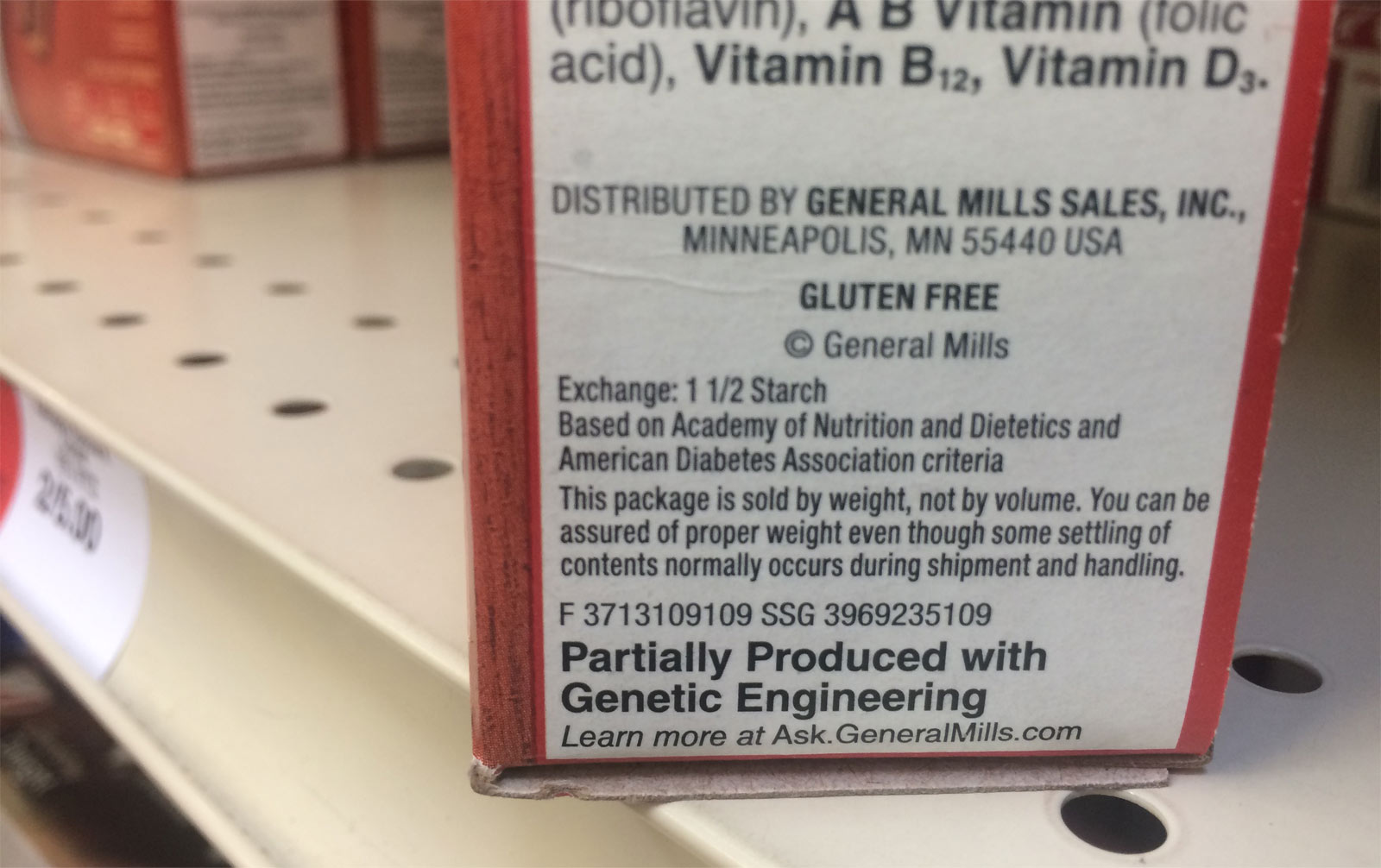One of the biggest arguments against labeling foods containing genetically modified ingredients is that consumers would view the labels as a warning and not buy GMO labeled products. Real world experience by major food companies and published research shows that claim to be false, that the labels have had no impact on product sales. In fact, research has even indicated that GMO labels improve people’s confidence in GM foods.
Major food companies labeling GM foods
In early 2016, several major food companies including Campbell’s, General Mills, Mars, Inc., ConAgra, Frito-Lay, and Kellogg’s announced they would begin labeling food products containing GM ingredients. This was done in advance of Vermont’s GMO labeling law scheduled to take effect in July 2016.
The companies used label statements such as “produced with genetic engineering,” “partially produced with genetic engineering” or “may be produced with genetic engineering,” which were in accordance with the Vermont law.
But the “Bioengineered Food Disclosure Act” passed by US Congress and signed by President Obama in July 2016 overturned Vermont’s law, aiming to establish a national GMO labeling standard. Many critics opposed the national standard’s allowance for food companies to use complex QR codes for disclosure of GM ingredients.
Since then several major food companies, including Campbell’s, General Mills, Frito Lay, Dannon, and Mars, among others, have continued to label their products as containing GM ingredients. Kellogg’s has stopped using GMO labels in favor of an online tool to help consumers find out whether a product contains GM ingredients.
Zero impact on sales
Labeling opponents have insisted that GMO labels will act as a warning and dissuade consumers from buying labeled foods. An article in National Geographic stated: “To the majority of Americans, a GMO label on a can of corn might as well be a skull-and-crossbones.” A 2016 USA Today editorial was titled: “GMO Labels Feed Fears.” Jill McCluskey, a Washington State agricultural economist, told Harvest Public Media in 2016: “I think if consumers see the label that this contains genetically modified food, and that’s a requirement by the U.S. government, they will feel it’s something they should avoid.”
Are consumers avoiding products with GMO labels? According to the companies with GMO labeled products, the labels have had zero impact on sales.
“The disclosure of GM ingredients in those products that are made with them has had no impact aside from anecdotal notes of congratulations and thanks from shoppers,” says Michael Neuwirth, Dannon’s senior director of external communication.
The same is true at General Mills. “We haven’t noted any strong consumer response, and haven’t seen any impact on sales,” says Bridget Christenson, General Mills media relations representative.
Thomas Hushen, media representative at Campbell’s, also hasn’t seen any negative impact of GMO labeling. In fact, he says the company has received positive feedback.
“Regarding sales, there are a variety of factors that impact sales and we can’t attribute changes to any one thing,” he says. “(Labeling) was a popular decision in the eyes of consumers and customers.”
Hushen said Campbell’s talked to “thousands of consumers” about labeling.
“We know consumers want labeling so we did research by talking to them to understand more about what they wanted that label to say,” he says.
Campbell’s recently announced that it was quitting the Grocery Manufacturers Association over the group’s opposition to mandatory GMO labeling.
GMO labels have positive effect in marketplace
Published research confirms the real world experience of big companies with GMO labels. Jane Kolodinsky, professor of community development and applied economics at the University of Vermont, has published studies based on consumer surveys showing that people are unlikely to view GMO labels as a warning.
“There is evidence this (GMO labeling) isn’t going to scare people away,” Kolodinsky says. “People have confidence in the FDA. If people feel it is unsafe, and the government labels something, they believe the government is not going to allow products on the market that are unsafe.”
In fact, Kolodinsky has found the opposite: that GMO labels can actually increase consumer confidence in GM foods.
“The labels improve people’s confidence in GMOs. It’s absolutely the opposite of what you would expect. Its tiny, but significant.”
Kolodinsky’s findings have been confirmed by earlier research. A 2014 study of consumer attitudes by Jayson Lusk, an agricultural economist at Purdue University, found that “the mere presence of a GMO label did not lead to a greater level of concern about GMOs.”
Kolodinsky also found that a majority of consumers, 78 percent, prefer a simple label disclosure, while another 77 percent opposed the use of QR codes as a disclosure method.
Overall, Kolodinsky sees GMO labels having a positive effect in the marketplace.
“My hypothesis is that what labeling is going to do is to stop this whole debate because people who want the information and are going to use it will have choice in the marketplace and people who don’t care are going to go on their happy business. We will have a competitive marketplace where consumers will decide and their desires will be met by a variety of offerings.”





